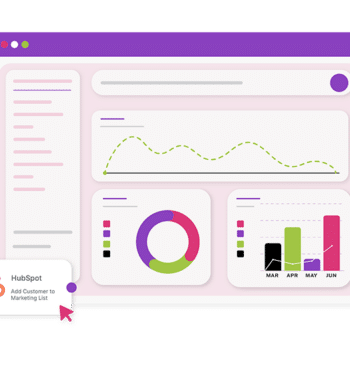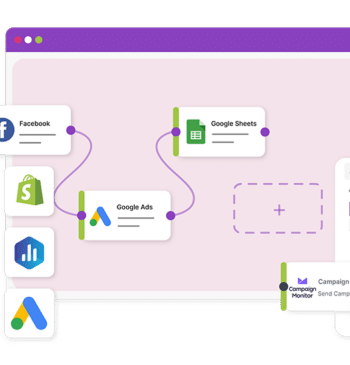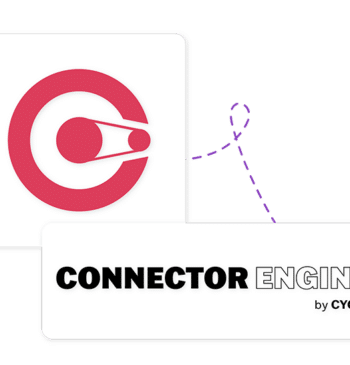19 Jun
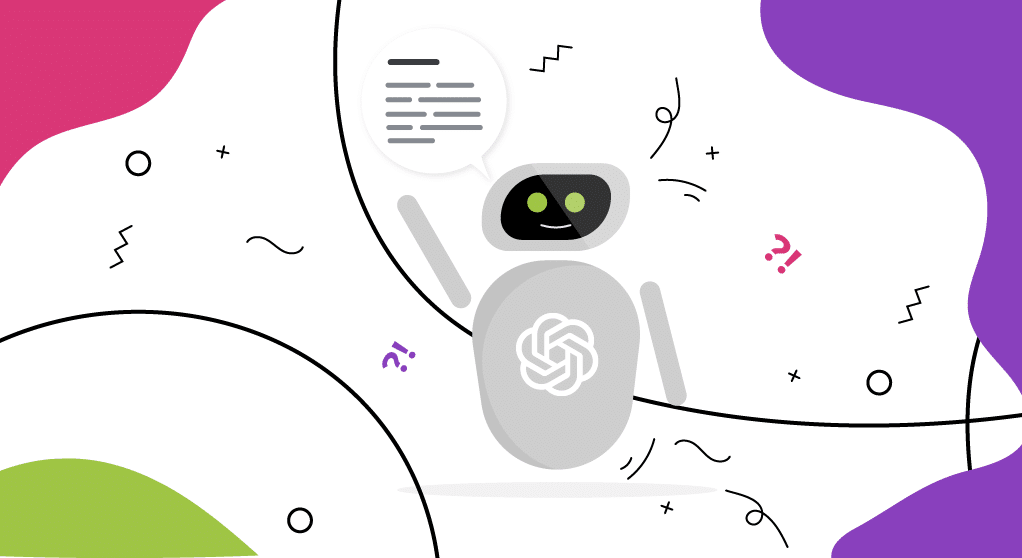
…
AI (Artificial Intelligence) is THE buzzword of late because OpenAI has sped up the AI game with the launch of the ChatGPT app last year. ChatGPT is an artificial intelligence natural language processing tool that has been developed for conversational applications. The application can answer questions and assist users with tasks. These tasks could be composing emails, essays etc.
In the first two months of launching it is estimated to of reached 100 million monthly active users, this makes it one of the fastest-growing consumer applications in history according to Reuters.
With an ample amount of users, it makes sense to continue adopting AI across business processes, currently, 80% of industry experts already integrate some form of AI technology according to HubSpot. It, therefore, makes sense to continue using AI and ChatGPT alongside marketing automation software.
What are some marketing automation examples?
Firstly, marketing automation has been increasing in use across marketing teams either in-house or in digital agencies. As they can simplify and streamline repeated processes.
There are numerous marketing automation examples across different channels and industries. Here are a few common examples:
- Email Marketing Automation: Email marketing automation involves sending targeted and personalised emails based on predefined triggers or customer behaviour. For example, a welcome email series for new subscribers, abandoned cart recovery emails, or re-engagement emails for inactive subscribers.
- Social Media Automation: Social media automation tools allow businesses to schedule and publish posts across multiple platforms in advance. They can also automate social media monitoring, engagement, and even content curation. For instance, automatically sharing blog posts on social media or responding to comments and messages.
- Lead Nurturing Automation: Marketing automation software enables businesses to nurture leads with automated workflows. This involves delivering relevant content to prospects based on their interactions with the brand. For example, sending a series of educational emails to guide leads through the sales funnel.
- Personalised Website Experiences: Marketing automation can personalise website content based on visitor behaviour and preferences. Businesses can dynamically display tailored content, product recommendations, and targeted offers by tracking and analysing user data.
- Customer Relationship Management (CRM) Integration: Marketing automation platforms often integrate with CRM systems, allowing businesses to streamline their sales and marketing processes. It enables automatic lead capture, lead scoring, and seamless handoff of qualified leads to sales teams.
- Behavioural Trigger Campaigns: Marketing automation can trigger specific actions based on user behaviour. For instance, they are sending a discount code after a user abandons a shopping cart, or sending a follow-up email series after someone attends a webinar.
- Event Management Automation: Marketing automation software can assist in managing and promoting events. It can automate event registration, and send confirmation emails, reminders, and post-event follow-ups.
- Drip Campaigns: Drip campaigns are a series of pre-scheduled, automated emails or messages sent to a specific audience over time. These campaigns can be used for onboarding new customers, nurturing leads, or promoting specific products or services.
These are just a few examples of how marketing automation is utilised. The specific use cases and implementations can vary widely based on the goals, industry, and target audience of your client’s business.
How can ChatGPT help you achieve your client’s marketing automation objectives?
An AI-powered tool such as ChatGPT combined with a marketing automation platform can help you achieve your client’s marketing automation objectives and save your digital agency time.
Firstly, connect the ChatGPT app to other third-party applications in your stack. Then it’ll be able to enhance marketing efforts, improve productivity and save marketing teams time. For instance, the platform can be used to research audiences for marketing campaigns or generate press releases and emails from a defined list of rules.
Other ways ChatGPT can assist in achieving marketing automation objectives in the following ways:
- Campaign Planning and Strategy: ChatGPT can provide insights and recommendations on campaign planning and strategy. It can help identify target audience segments, suggest effective marketing channels, and propose automation workflows for lead generation and nurturing.
- Content Creation and Personalisation: ChatGPT can generate content for various marketing channels, including email marketing, social media posts, and blog articles. It can tailor content based on user data, such as demographics, interests, and behaviour, to provide personalised experiences.
- Lead Generation and Qualification: ChatGPT can assist in creating lead generation forms, landing pages, and chatbots for capturing and qualifying leads. It can guide users through the lead qualification process by asking relevant questions and providing automated responses.
- Customer Engagement and Support: ChatGPT can act as a virtual assistant, providing automated responses to customer inquiries, handling common support queries, and offering product recommendations. It can engage with customers through chat interfaces, social media, or the website, enhancing customer experience and satisfaction.
- Data Analysis and Reporting: ChatGPT can analyse data and generate reports to provide insights into campaign performance, customer behaviour, and engagement metrics. It can assist in identifying trends, patterns, and opportunities for optimisation.
- Continuous Learning and Improvement: ChatGPT can learn from user interactions, feedback, and performance data to improve its responses and suggestions over time. It can adapt to changing marketing objectives and stay up-to-date with industry trends and best practices.
ChatGPT cannot directly execute marketing automation tasks, but once connected to a marketing automation tool it can serve as a valuable resource for planning, strategising, content creation, customer engagement, and data analysis, contributing to the successful implementation of marketing automation objectives.
ChatGPT Marketing Use Cases
There are numerous ChatGPT marketing prompts, here are some use-case examples that you could implement with a marketing automation platform to ease marketing processes:
- Generate text for an ad campaign that is visually appealing.
- Generate a list of keywords on a specific topic “automation software” – refine this further by only listing keywords that have a high volume.
- Provide a list of top 10 ranking blogs on the keyword <keyword>.
- Suggest blog topic ideas for “Marketing Automation Services” that can rank on Google.
- Create summaries for new blog content to create tweets.
- Start ChatGPT conversations from new Unbounce form submissions.
- Generate a content outline with ChatGPT from a new WordPress page.
- Create an email summary from a new WordPress blog post.
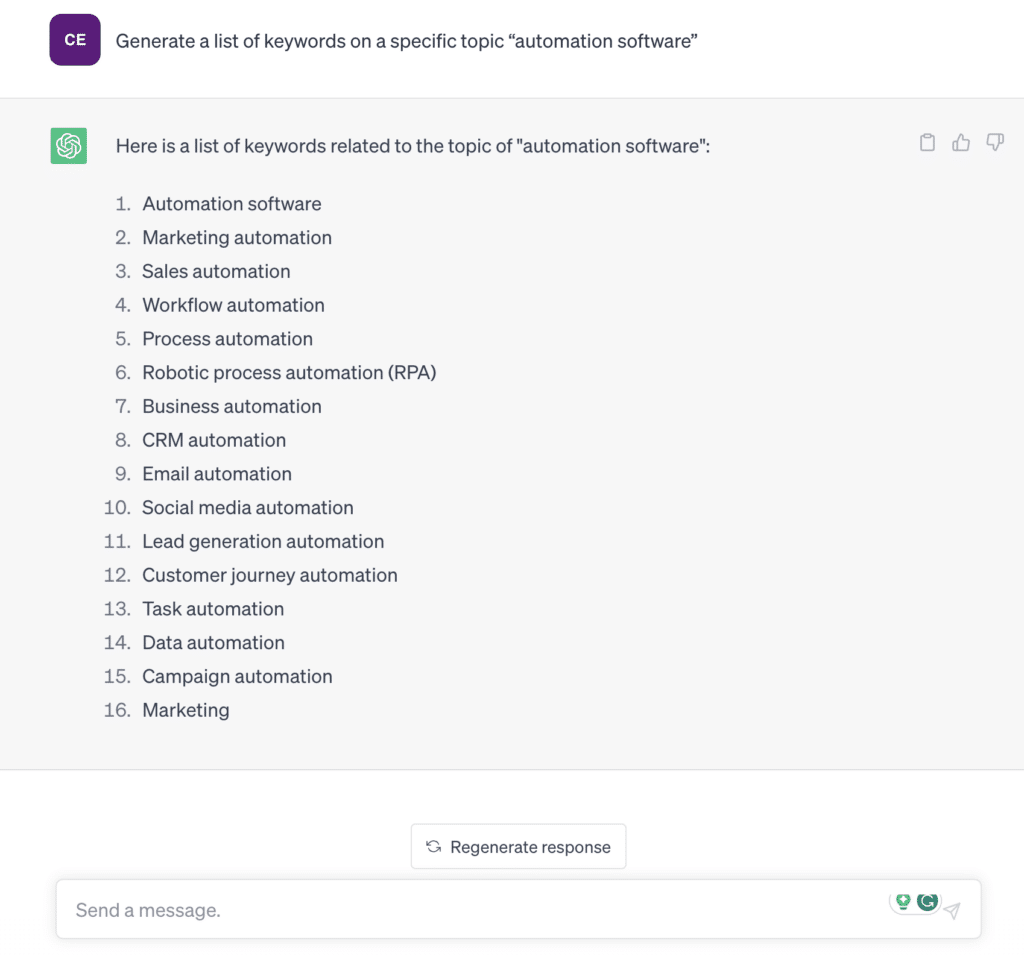
What are the advantages of using an integration platform for your digital agency automation?
There are numerous advantages to using marketing automation tools, here are some of the benefits.
- Time and Resource Savings: Marketing automation software automates repetitive tasks such as email campaigns, social media posting, and lead nurturing. This saves time and allows marketers to focus on other important activities.
- Improved Efficiency: By automating manual processes, marketing automation software streamlines marketing workflows, reduces errors, and increases efficiency. It enables marketers to execute campaigns more quickly and effectively.
- Personalisation and Segmentation: With marketing automation, businesses can segment their audience based on various criteria and deliver personalised messages to each segment. This level of customisation enhances engagement and improves the overall customer experience.
- Lead Generation and Nurturing: Marketing automation helps attract and capture leads through lead generation forms, landing pages, and targeted content. It also enables lead nurturing by delivering relevant content based on user behaviour and tracking interactions to identify sales-ready leads.
- Campaign Tracking and Analytics: Marketing automation software provides comprehensive analytics and reporting capabilities. Marketers can track campaign performance, measure key metrics, and gain insights into customer behaviour. This data helps optimise marketing strategies and make data-driven decisions.
- Integration and Centralisation: Many marketing automation platforms integrate with other tools and systems, such as CRM software, social media platforms, and customer support systems. This integration centralises data and enables a holistic view of customer interactions, enabling better coordination across marketing and sales teams.
- Scalability and Growth: Marketing automation software scales with business growth. It can handle increasing volumes of leads, contacts, and campaigns without requiring significant manual effort. This scalability supports businesses as they expand their marketing efforts.
- Enhanced Lead-Scoring and Qualification: Marketing automation software incorporates lead-scoring mechanisms that assign values to leads based on their behaviour and engagement. This helps prioritize leads for sales teams and ensures more efficient lead qualification and follow-up.
Overall, marketing automation software empowers businesses to streamline their marketing efforts, improve customer engagement, generate more leads, and optimise their overall marketing ROI.
We have developed a ChatGPT Connector to work alongside our marketing automation platform, ConnectorEngine. The API has a variety of methods and endpoints for you to customise client workflows to automate marketing tasks.
For more information get in touch with the team, and we’ll happily walk you through a demo.
